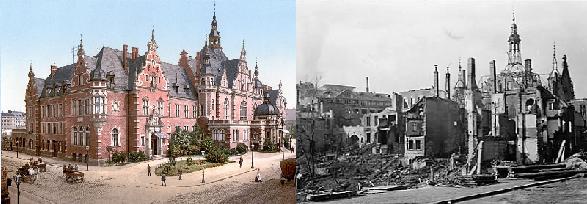The Horrors of War
Small army units had found temporary shelter and accommodation in private homes. Opa and his war-weary comrades slept in a basement from 22 hours till three in the morning when enemy shellfire woke them up. The barrage lasted for three hours. Some shells exploded in close vicinity of the house, where he was staying. At 7:30, a series of fierce skirmishes erupted while Allied dive-bombers were pounding their position at Steigerwald, a district of Erfurt. One bomb hit their temporary home. It smashed through the roof and exploded inside, causing the building to collapse like a house of cards. Fortunately, the civilians had all been evacuated, thus preventing unnecessary injury and loss of life.

On Wednesday, April 5th, following the first marching order, Opa arrived by train in Leipzig at 22 hours. He quickly hid the wooden box filled with food supplies intended for his family while sirens were announcing another bombing raid. He managed to find shelter in a private basement room, from where he made a phone call to his superior and old acquaintance by the name of Jepsen. The German signal corps was still able to keep the lines of communication open, whereas the public telephone system had been out of order for some time. Opa received a heart-warming reception from his former colleague and friend. While he was being brought up to speed on the current frontline situation, he also received instructions about his role in the constantly shrinking space being held by German troops. Another bombing raid rained terror, fire and death from the unprotected sky. At three in the morning, Opa finally went to bed and found some much-needed rest. But he could not fall asleep.

Worries about his family kept him awake. Hundreds of questions occupied his mind, to which he had no answers. Had the Americans already reached Weimar? Was the rumour true that their tanks have pushed their way to Gotha? How was his wife faring under these chaotic conditions? Was she still alive? And what about his stepdaughter Elsbeth? Then his thoughts turned to his twins Gertrud and Walter, whom he had held on his arms only two months ago? How were they doing? Was Mutti able to take care of them? When seen through the eyes of a caring and loving father, who must serve as a soldier fighting for his country, war takes on a new horrific dimension that goes beyond killing the enemy, worrying about getting killed, about death and destruction all around you. For every soldier killed in action, a mother will mourn the loss of her son. A sweetheart will never meet her lover again. A wife will have lost her husband and the father of her children. But when a soldier survives the horrors of the killing fields and returns home from a POW camp, and discovers that his entire family had perished in one of the horrendous aerial attacks, then what more is there to say about the utter and total senselessness of war? Having been a conscientious police officer and army captain faithful to country and convictions, Opa meditated deeply about things of concern to him. He often liked to share his views with friends and relatives in his massive correspondence later in the early sixties, from which I derived a lot of valuable information.
tWar leaves devastation behind in its wake. There are no true winners. Ethnic groups wiped out, the death toll staggering, the human cost beyond comprehension. Yet some were able to survive and rebuild their lives.
LikeLiked by 2 people
As Pure Glory said, war has no winners.
LikeLiked by 1 person
We just watched a documentary about WW1. I mean, who in his right mind would want another war after that one? Not even a generation later WW2 was on. What is wrong with mankind?
LikeLiked by 1 person
If it was not for the threat of total annihilation we would have had WW3 long time ago.
LikeLiked by 2 people
I agree, will we ever learn?
LikeLiked by 1 person
And now that we have created these tools of mass destruction, they can never be ‘un’created, can they?
LikeLiked by 1 person
I can not fathom Opa’s worries and anxiety , what a horrible mind to live in.
LikeLiked by 1 person
Your stories bring the true horrors of war to life. I wish those who want to start wars would consider their terrible effects just a little bit more…..
LikeLiked by 1 person
A song reminds us of the futility and horror of war: Where have all the flowers gone? When will they ever learn …
LikeLiked by 1 person
It seems a truth of human nature that there will always be some people want to dominate other people, as well as some who rise up against that domination.
LikeLike
amazing article!
LikeLiked by 1 person